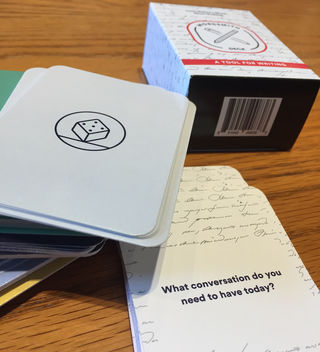Creativity
Journaling as Improvisation
Creating and sustaining a daily writing practice.
Posted March 1, 2019
Each morning, I write three pages in my journal, with no requirement about subject matter, topic, or approach—just that I write. Something. Anything. The only rule is to keep the pen or pencil moving, and I follow wherever it leads.
I was first inspired to start this practice when I read Julia Cameron’s The Artist’s Way: A Spiritual Path to Higher Creativity. She describes what she calls Morning Pages as follows: “There is no wrong way to do Morning Pages—they are not high art. They are not even 'writing.’ They are about anything and everything that crosses your mind—and they are for your eyes only. Morning Pages provoke, clarify, comfort, cajole, prioritize and synchronize the day at hand.”

What I’m finding with my daily morning writing practice is that it helps me to think improvisationally. I work with whatever thoughts, feelings, emotions, or ideas I have in any given moment, and I spin those into an entry. Maybe I’m thinking about the dog, or something I talked about with my students yesterday, or politics. I start with whatever’s at the top of my mind, and I go from there.
As a violinist-turned-fiddler, I’ve thought a lot about improvisation over the last several years, and how much of what we do in daily life is a form of improvisation. Journaling, I’m finding, is no different. It involves some of the basic elements of words and sentences and themes, but how I put those together in any particular moment is an improvisation. By the time I’m finished with a journal entry, I’ve created something new, something that didn’t exist before and will not exist again. And, particularly with these pages, what I’ve created is not nearly as important as the process of creation itself.
It also helps, if I can’t think of anything to write about, to actively look for inspiration. This inspiration might take the form of random words, which I find by flipping through the dictionary or through using the random words part of an app from Writing.com called Writing Prompts. What I love about random words is that they’re sparks, giving me a way into and through my sometimes sluggish or seemingly idea-less mind. Random words always help me to generate something.
I also like using journaling prompts. Recently I got a deck of cards from BestSelf Co. called the WordSmith Deck, which is a collection of 100 prompt cards specifically designed to generate writing. These cards pose questions like “What’s your happiest memory from your childhood?”, “What does the world need to know right now?”, and “What don’t you have enough time to do? Why?”
I never know what I’m going to get when I pull a card from this deck, and that randomness is much of the fun of using it. It’s a kind of game, and it takes away the sometimes difficult task of trying to figure out what to write about. The question I get might not be one I would have thought of, or even that I prefer, but it gives me somewhere to begin. It’s like having a basic melody or chord structure and then using that to improvise something new.
Another source of journaling prompts that I like is a book called 365 Journaling Ideas: A Year of Daily Journal Writing Prompts, Questions & Actions to Fill Your Journal with Memories, Self-Reflection, Creativity & Direction, by Rossi Fox. It, too, provides a wealth of ideas and suggestions to get started with journaling when you’re not sure what to write about.
We might think of improvisation as something that’s done in a vacuum, a kind of in-the-beginning-was-the-word moment, where we create something completely from scratch. In my experience, however, that’s not how improvisation works. It works best when there’s some spark, some framework, some idea to start with, and then I can take it from there.
Sometimes as journal writers we can create our own sparks out of flux and flow of our daily lives. Sometimes, though, it can help to have a little nudge, something that defines at least a few parameters, and then we can improvise from there.


